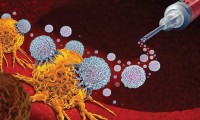-
BBSRC invests £48m in Babraham Institute to advance lifelong health research
- Source: drugdu
- 108
- May 16, 2024
-
Answering the Call
- Source: drugdu
- 72
- May 14, 2024
-
Sino Biological concludes SignalChem acquisition for $48m.
- Source: https://www.pharmaceutical-technology.com/news/sino-biological-signalchem-48m/
- 83
- May 4, 2024
-
“Profound concern” over WHO’s pandemic agreement, says AIDS charity
- Source: https://www.pharmaceutical-technology.com/news/profound-concern-over-whos-pandemic-agreement-says-aids-charity/?cf-view
- 138
- May 4, 2024
-
KCL study reveals particles in cows’ milk effective for oral delivery of RNA drugs
- Source: drugdu
- 107
- May 1, 2024
-
Candel wins FDA orphan drug designation for pancreatic cancer drug
- Source: drugdu
- 74
- April 16, 2024
-
Unitaid funds over £6m to Liverpool researchers to treat major diseases
- Source: drugdu
- 141
- April 10, 2024
-
CanSinoBio Invited to Boao Forum for Asia 2024 Annual Conference
- Source: drugdu
- 138
- April 4, 2024
-
Minhai Biotech Signs Strategic Cooperation Memorandum with Daxing District Government and AstraZeneca
- Source: drugdu
- 136
- March 30, 2024
-
FDA Approves Roche’s Cobas Malaria Test, Designed to Screen for Malaria in Potential Blood Donors
- Source: drugdu
- 142
- March 29, 2024
your submission has already been received.
OK
Subscribe
Please enter a valid Email address!
Submit
The most relevant industry news & insight will be sent to you every two weeks.













